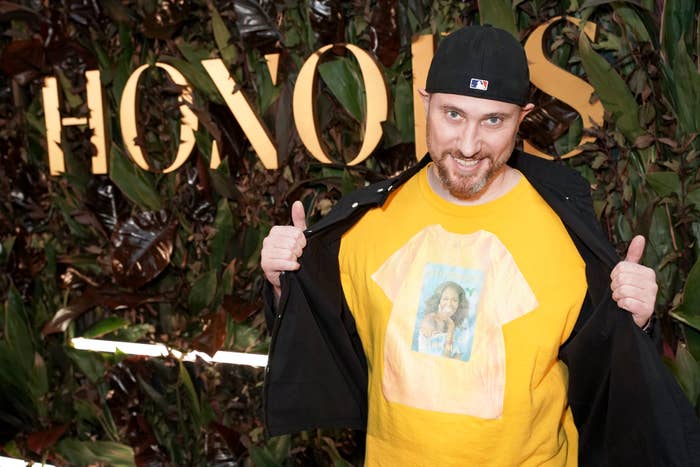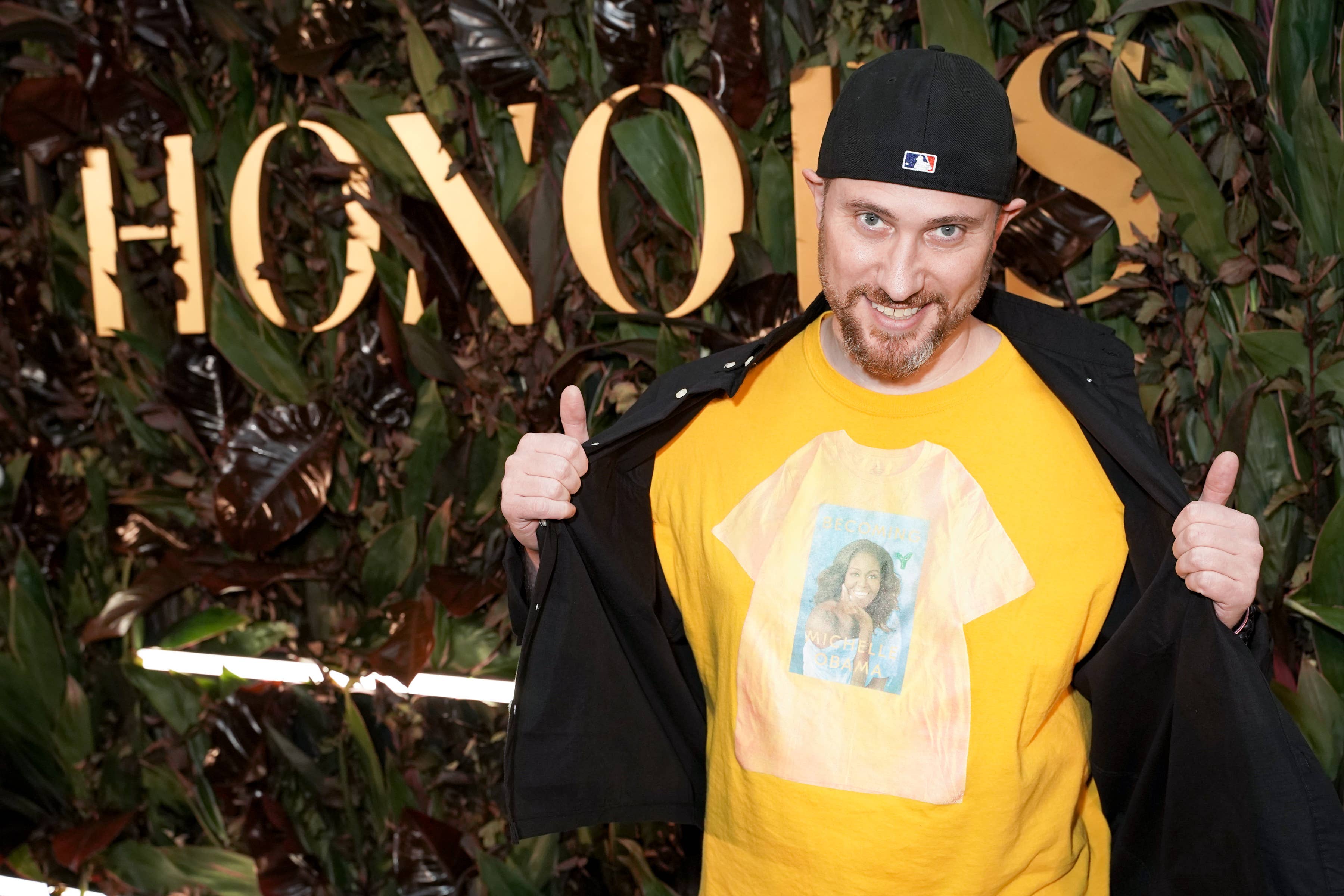
Yes, Paris Fashion Week has changed, and now if you are affiliated with streetwear and sneakers, you probably attend. But seeing StockX’s co-founder Josh Luber attend shows like Dior and Who Decides War made us curious.
Why is someone from a sneaker reselling site attending shows at Paris Fashion Week in the same way a buyer would? And why did StockX sponsor Reese Cooper’s first Paris Fashion Week presentation? We decided to talk to Luber to find out. He believes the future of StockX will involve brands selling new product directly on the site, and for younger brands, StockX may be offering a more advantageous selling model than wholeselling.
Read below to see what StockX has planned for working diretly with brands, why they sponsored Reese Cooper’s presentation, and how brands feel about selling product on the popular e-commerce site only for it to be resold at a higher price on the same platform.
I’ve seen you going to a lot of shows, which I was intrigued by because you work for a sneaker reselling site. Why was StockX at Paris Fashion Week?
A year ago I was supposed to be in Paris and I got to the airport and noticed my passport expired in two months instead of six, so I ended up missing Paris. But Paris Fashion Week has become sort of the intersection of all of the businesses that we're part of. It's obviously no longer just fashion. It's sneakers and streetwear and art and collectibles and everything else, which is all the things that we do. So the last 18 months for us, and then particularly for the next year moving forward, a big focus for the growth of our business is going to be working directly with brands to release products directly into the marketplace.
You’ve already started selling new products directly on the site, right?
Yes. In October we had a release with Adidas. We call them IPOs or Initial Product Offerings. They were three pairs of Adidas shoes that were exclusive to us. We actually did one shortly after that with Topps, the baseball card company, as we've recently launched trading cards onto the platform.
Obviously trading cards are probably the one area that's farthest away from Paris. But just in general, that's the evolution of our business, which is why we did the activation in Paris last season and why we’ve been spending more time here. This time we didn’t have an activation, but I went with Tom Woodger, who runs all of our brand partnerships. So we are taking meetings with brands, and the people that we continue to work with. We're helping launch new products, that's just the future of our business. That's the high-level reason that we were there.
What’s the plan for selling new product on the site? Is it a bidding process?
For our IPOs, or Initial Product Offerings, we do what we call a Blind Dutch Auction, and it allows the market to set the price. People bid and say how much they're willing to pay for that item. Then we basically create the fair market price and it goes into the market. That's the high-level idea of all brand releases, which is no longer retail pricing, it's market price. We think that's sort of the future of these products.
So once the market determines the price, then everybody can purchase it for that same price?
Yes, all the people that participate in the IPO. With the Adidas release, it was three different styles and there were 333 pairs of each. After the IPO clears, the price is set, and everyone who participated in the IPO will pay that amount. Then if they want, they can continue to resell that product, which is often what happens.
How do brands feel about their product being resold for a higher price after it was just sold for another on the same platform?
Yeah, that is definitely one of, if not the biggest, challenge, but that is a 35-year-old issue. That dates all the way back to 1985 and the first Air Jordans. Nike and Jordan Brand have always had this very willful blindness policy towards the secondary market because obviously everything they do, putting out limited product that has high demand, creates the secondary market. Obviously the brand benefits from it with all the hype and everything around it. But for the longest time, the brands would also try to stay away from it. They're all, 'That's not us. We don't have anything to do with that,' when clearly they do. The idea for us is that resale is not going away. Just like other industries have evolved, it's time to start working together.
What we found is that the feelings there are universally inevitable. There's no one at any brand that doesn’t agree that working with resale is inevitable. But everybody has different opinions on how, when, and with what products. As you know, the brands are made up of lots of different people. So usually you have more of the old school people who want to stay farther away and the newer data-focused people, more digital people, that are more interested in working together. The Adidas release was a really big deal for us because it showed that Adidas is willing to step in front and say, 'Hey listen, we're happy to work with the resell market. We think this is important.' That's a big part of what we've been doing with all brands now is working with them to move down that path.
I also see that StockX helped sponsor Reese Cooper’s presentation. You all have a vested interest in fashion/streetwear brands. How much do you all want that to be a part of the business?
I think it’s 25 percent of our business today. Obviously, a big part of that is Supreme, but if you're on the site, you'll also find Louis Vuitton bags, and then you'll find Kith and Bape. You find a lot of Virgil [Abloh]'s bags and Louis Vuitton. So apparel is already a big piece of our business. For us, it's about the high-level hypothesis here, both for StockX and for where we are right now, is everything converges. There used to be this very clear line of sneakers, streetwear, watches, handbags, art, collectibles, etc., and now it's blurred. You have KAWS who does his artwork, but he also works with Jordan Brand and collabs with clothing brands. And that's kind of where we sit. We think the other convergence of all that is retail and resell. The idea that we're a resale platform is true. That's how we started. But the person doesn't care whether it's retail or resale, they just want the product. So that's the idea. Whether the business grows within apparel or streetwear or fashion or collectibles or toys, for us it's all the same, and it's just working with brands to put products out there that the customers want.
How did the Reese Cooper partnership come about?
We have a lot of friends in common with Reese and the people he works with, so we're working on a larger project with Reese down the line. We asked Reese how we can support him and he was focused on his first show in Paris. We actually also helped with the New York show and activation he did during New York Fashion Week. Last summer we helped sponsor Born X Raised’s kickoff party. All of this is in the same category of working with brands, becoming closer with those companies, and then eventually we think it's that StockX becomes a platform that a lot of brands end up releasing a lot of products on. That's sort of the long term goal, and a lot of the high-level reasons why we're there.
Do you think StockX will turn into this incubator for emerging fashion brands?
Yeah, absolutely. We're not an alternate retail channel. We're not like the competitor with Foot Locker or SSENSE. We're really a tool that allows the brand to go direct to the market. Ultimately, all of that is working with the brand to help the brands release a product. Whether that's us helping to sponsor the show so that he can focus on what he does, whatever it is, it's all in the same area of helping the brand.
You said you aren’t like an SSENSE? So what is the arrangement with these brands on the backend. Is it a wholesale relationship?
The brand sells the product directly on the site and we take a cut, that’s usually around 9.5 percent, of what’s sold. We're just a platform. In the same way that, if you think about it, if you buy something on eBay, you buy it from that seller, you're not buying it from eBay. EBay is just the platform. That's really the idea here for us, too. We're a platform just like eBay, which is much different than, say, Farfetch, which takes 35 percent, or wholesale, which takes 50 percent.
And I have to ask, what are you guys doing about protecting customers’ information? There’s a lot of chatter about it online.
Yeah, this is a high priority of the business, and any company. There's a lot of people that want to just say a lot of things on the Internet. I can't control what people say on the Internet. But there's not much more in that. It's the highest priority in the business, and we take our customer's information and security as serious as it could possibly be.

